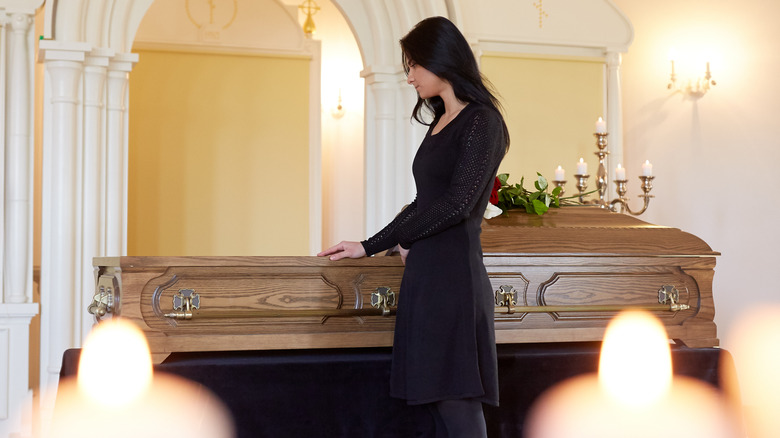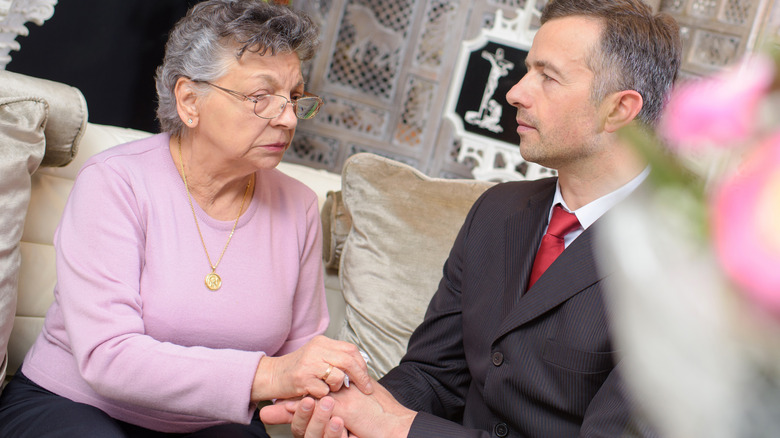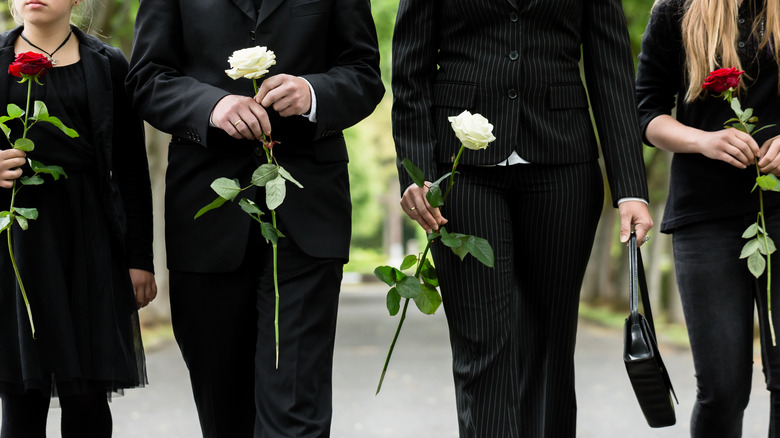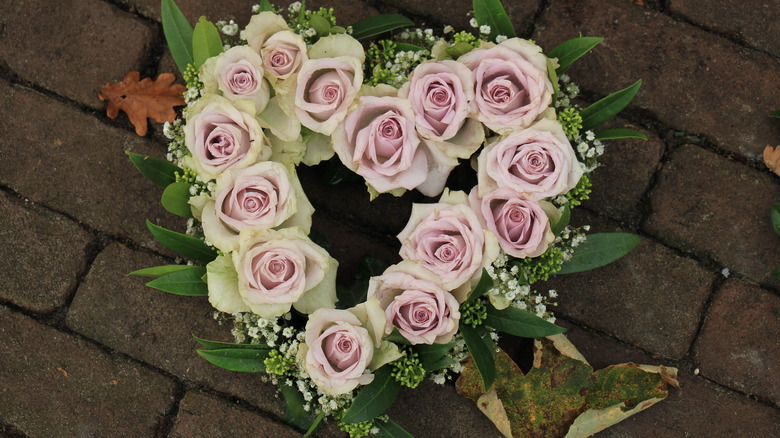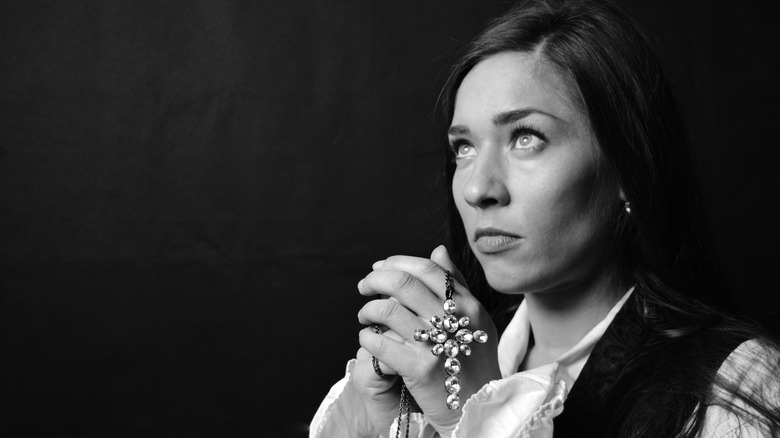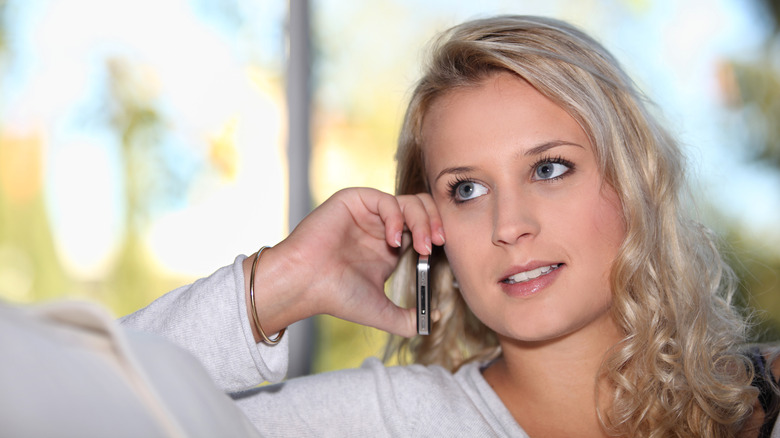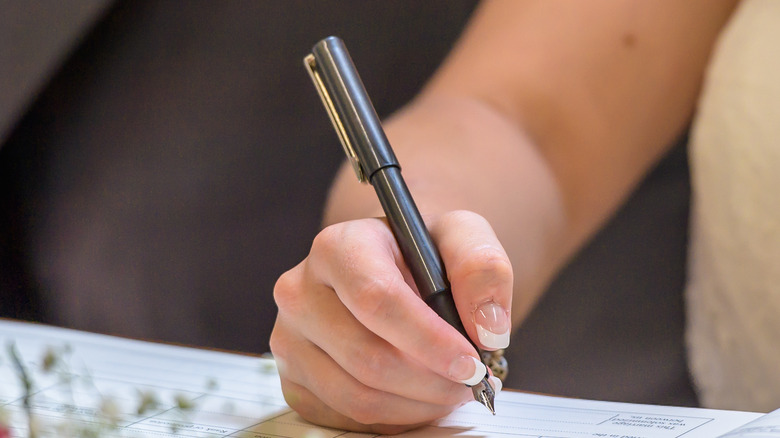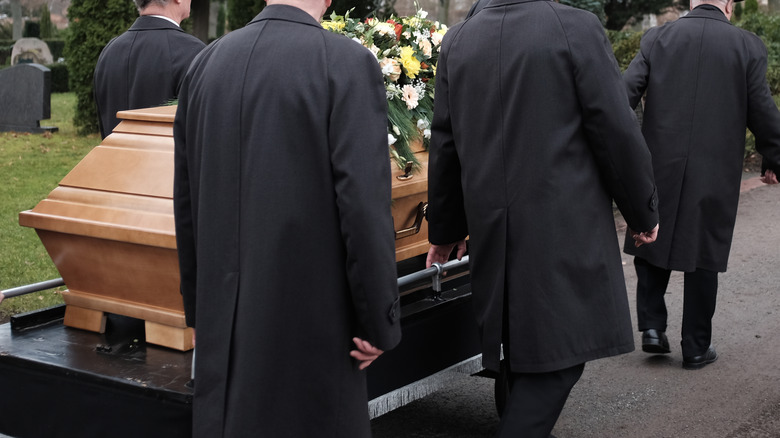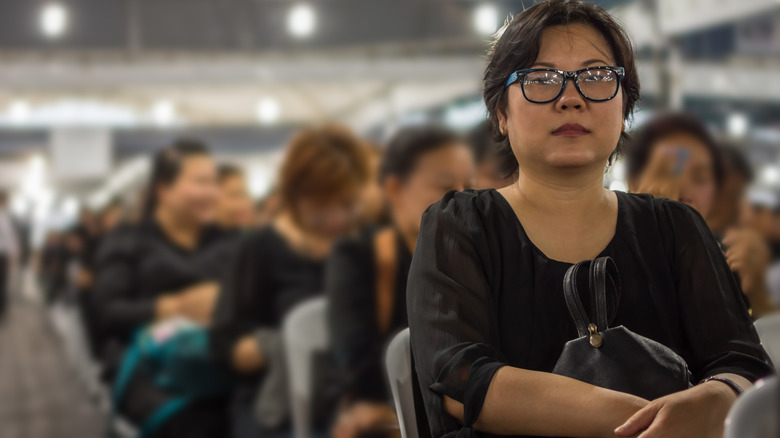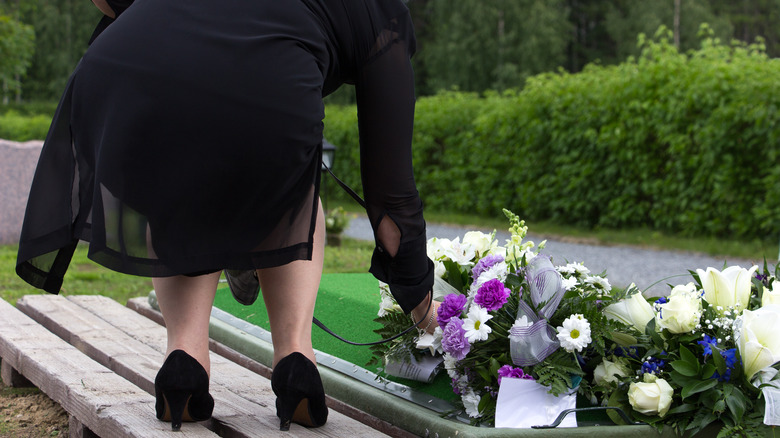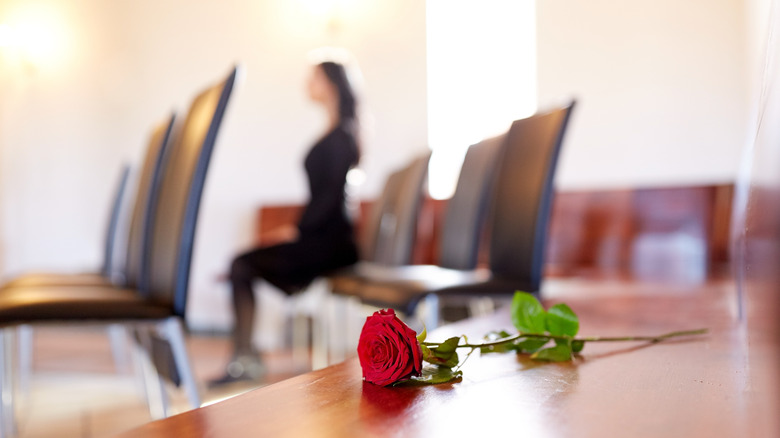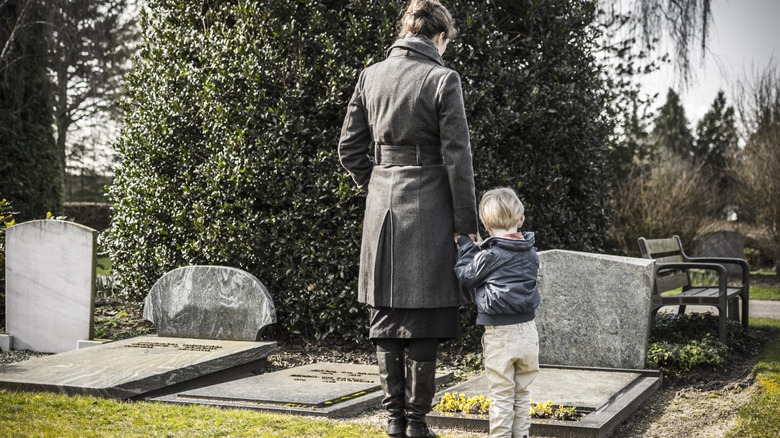7 Things You Should And 7 Things You Shouldn't Do At A Funeral
There is no denying that at some point in our lives, we will all have to attend a funeral. At this point in my life, I have unfortunately attended more than I can count on one hand. But just because we have to go to a funeral, doesn't mean we know the proper etiquette around attending this kind of event.
Whether you are attending for the loss of your own close friend or family member, or showing support for someone else who has lost their loved one, you want to ensure you're being respectful, caring, and sympathetic during these difficult and heartbreaking moments.
Do make sure to offer your condolences
Funeral services are understandably overwhelming for the family. While grieving the loss of their loved one, they also need to find a way to play host to everyone who attends. With that said, you shouldn't expect them to come to you, but rather you need to prioritize taking a few moments to offer your sincere condolences.
Julie Esteve Boyd, International Etiquette Consultant who has personally trained and coached members of royal families, politicians, and household service staff, told me: "A few simple words of sympathy should be expressed to the family. They won't come to you, you go to them."
If you aren't sure the family will know who you are or how you knew their loved one, don't be afraid to let them know and make that connection. At my grandmother's funeral last year, some of her longtime friends came up to me to offer their condolences. They let me know they used to play dominoes with her and my grandfather, immediately helping me put a face with the names from stories I heard many times growing up.
Do wear appropriate attire
When it comes to what to wear to a funeral, I think most people know the safest option is to just wear something black. While black is a good choice, Esteve Boyd pointed out that it's most important to wear something respectful and subdued, "avoiding any overtly colorful clothing or any overtly casual clothes such as jeans." She mentioned if you think of attire you would wear to a job interview, you're probably pretty safe.
One of my aunts was known for always wearing the brightest colors of clothing or neon colored shoes; when she passed away, we all still wore appropriate clothing, but added in bright accent colors in her honor. It felt right in that instance, and it was definitely the exception, not the rule.
Do make sure to send a card or flowers
Upon hearing of someone's passing, the first thing you should do is head to the store to pick up a sympathy card to send to the family. While email is a very convenient way to connect and stay in touch, this is not an appropriate method for offering condolences. Instead, opt for a hand-written note or card.
If you want to send flowers, it's appropriate to either send it with the card or to the funeral venue ahead of the service. Carole Brody Fleet, award-winning author of book, Loss is a Four Letter Word... (out in 2018) told me, "Do not attempt to give flowers to the family during a funeral. You can send the flowers to the funeral venue and the staff will ensure that it is placed at the ceremony." After the service is over, the family will get the flowers and be able to see that you sent them.
From time to time, a family may request that instead of sending flowers, donations can be made to a particular charity or cause. In this case, Esteve Boyd mentioned this request should be honored.
Do switch off your phone
While we always have our phones on us these days, a funeral is not an appropriate time to be talking, texting, or scrolling through your Instagram or Facebook feed. This kind of behavior is an unnecessary disturbance and extremely disrespectful to the family and others in attendance.
"If you must take or make a call," said Brody Fleet, "quietly leave the service to do so." This is a great time to put your phone on silent, airplane mode, or maybe power it all the way down and just disconnect. When the service is over, you can turn it back on.
Do feel free to bring the family food
If you have ever been in the position of losing a loved one and suddenly needing to plan a funeral, you know that often also includes playing host or hostess to any out of town family. The extra time with one another is welcome and often helpful in the grieving process, but the reality is that it's a lot of mouths to feed.
Etiquette consultant and trainer at The Poise Pursuit, Devoreaux Walton, told me, "Taking food to the family days immediately following the death is appropriate, however, you should always call to find out what other people are bringing and if the family has any allergies, so you don't show up with a duplicate dish or something the family can't eat."
Speaking from experience, I can say just how helpful and sweet of a gesture this can be. After my grandmother's passing, one of her neighbors made a cake and left it on the porch with a sweet note, knowing we would all regularly be coming back to the house and would likely enjoy a little sugary pick me up during those long days. It was definitely appreciated by my family.
Do respect cultural and religious differences
It is important when attending a funeral to respect the family's cultural and religious choices, even if they are different from your own. "You must respect the customs of the bereaved," said Brody Fleet. "However, this does not mean that you must participate in that which would make you uncomfortable or goes against your own beliefs." She went on to explain that if others were kneeling in prayer, you do not need to join, but can just simply remain in your seat.
Many funerals also have separate viewings or visitations, but if you feel uncomfortable approaching an open casket, Brody Fleet also noted that it would be appropriate to quietly exit instead.
Do follow up with the family
We may feel that support and love from our friends and family immediately after losing someone, but once the services have passed and life returns back to normal, that does not mean we are done grieving the loss. Estelle Boyd suggests making a phone call or sending a note a week or two after the funeral as a way to let the family know that you are still thinking of them. This seemingly minor gesture can go a long way to a family who is in mourning.
Don't forget to sign the registry
Many funerals will have a guest book or registry near the entrance. If there isn't one, don't worry about this, but if there is, then make sure to sign it. Esteve Boyd suggests to include "a few brief words alongside your full name and the relationship to the deceased." With so many people potentially showing up, the family may use this registry as a way to remember who all came, but also as a way to ensure they are sending thank you notes to everyone who showed up to the services for their loved one, if they choose to do so.
Don't be late
If you are attending a separate visitation, there are usually a few hours for guests to come show their respect any time during those allotted hours. Otherwise, it's important to make sure you are on time for the funeral.
"Leave plenty of time for travel, in order that you do not walk into a service later or during an inopportune time (the casket processional or recessional, eulogies, etc)," said Brody Fleet. She went on to point out that most funeral venues have websites with full addresses, phone numbers, and directions, so make sure to look this information up ahead of time and plan to arrive about 15 minutes early.
Don't sit in the first three rows
If you find yourself unsure of where to sit when attending a funeral, Walton pointed out that "seating in the first three rows at a funeral is reserved for the family only." She went on to add that "a good seat choice as a guest, being a friend or acquaintance, is near the front where there is room available — behind the first three rows."
If you have kids who are too young to know any better, and seat themselves somewhere they shouldn't, make sure to quietly take them to a more appropriate seat. This happened at one of my grandfathers' funerals and it was very awkward for the family to ask the kids to move so they could sit in those seats. With that said, if you are family, don't be afraid to sit in those first few rows as guests should know to otherwise avoid them.
Don't make this about you
We have all experienced loss and, while it can be comforting to know you aren't the only person who has ever been through this kind of grief and mourning, when you are the guest, it is important to remember you are there for the bereaved.
"A funeral service is not the time for sharing you own loss experiences — you are there to comfort others," said Brody Fleet. She went on to add that the best and most comforting words you can say are, "I am so very sorry and understand how much pain you must be in. When you are ready to talk, I am ready to listen." It's important to make sure to follow through and be there for your friend when they are ready.
Don't show up uninvited
In my personal experience, I have only ever been to open and public funeral services, but obviously not all families choose to take this route. Walton pointed out that attending a private funeral is by invitation-only, and that needs to be respected.
"Unless you receive a request to attend, it is rude to invite yourself and show up," she said. If you did not receive an invitation to a private funeral but want to show your support, you can always reach out to the family, send a card or flowers, or offer to bring them a nice meal.
It should also be noted that even public funerals may have a private viewing time that is strictly for the family, in which case you should also respect that time for the family, and show up at the indicated appropriate time.
Don't take photos
If your phone is off as mentioned earlier, this wouldn't be a problem, but it's worth mentioning anyway that taking photos at a funeral is not an appropriate thing to do. Oftentimes funerals can bring together friends and family that haven't seen each other in a long time.
Esteve Boyd mentioned that "it would be thoughtless to whip out your phone for a selfie with a long lost friend!" Instead, you could make plans to grab dinner with the friend after the service and then take as many photos as you would like at that time.
My grandmother was a beautiful quilter and sewer, so for her service we put out many of her handmade pieces and projects. This included the quilt she made for my birthday when I turned 16, and her old wedding dress, which she cut up and sewed back together to make as a first communion dress for her granddaughters to wear. These were special pieces for the family that we knew others would enjoy seeing as well.
In this sort of instance, it would have been understandable if a guest asked to take a picture of one of these items. Brody Fleet mentioned that if you would like to take a picture of something, you should seek the family's permission prior to doing so.
Don't let children run around
We all obviously understand that funerals are not the most fun or exciting place to be, whether as an adult or a child, but it's important not to let any children just run around during the funeral or any accompanying visitation. "It's hard for children attending a funeral, but if they are unruly, it could be upsetting for those around you," said Esteve Boyd. "Prepare them beforehand so they know how to behave and what to expect."
